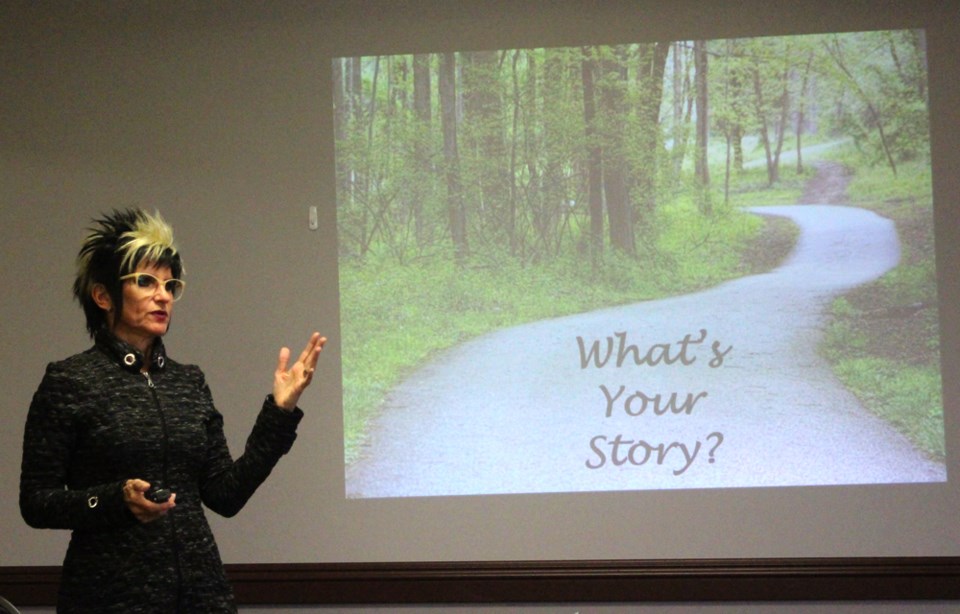Being mentally well is an important aspect to both life at home and life at work, and Sagehill Community Futures Development Corporation wanted to help people become more mentally well with a Don’t Sweat the Small Stuff: Your Well-Being or Your Life workshop at Hannigan’s Catering.
The Sept. 26 workshop was hosted by Certified Speaking Professional Deri Latimer.
Sagehill Small Business Specialist Susan Wehage noted she felt Deri would be a good person to bring to the workshop, after hearing a similar presentation at a conference the year prior.
“She just left me feeling so inspired that we just thought we would bring this to our region to help others feel inspired and provide some tips and tools on how to deal with stress and all the things in life.”
Latimer’s workshop focused on being well within one’s self, which she says is an important message, because it could be the difference between life and death.
“Well-being years ago used to be kind of a nice thing to have… whereas now with the complexity of our world it’s a matter of our survival that we need strategies, practices in place in our life to be well.”
Latimer notes there has been a big shift in the mentality surrounding being well with one’s self as well, noting she remembers a number of years ago feeling selfish focusing on herself.
“The message is the complete opposite is that you’ve got to focus on you first before you can serve your clients, before you can be a parent.”
Throughout the course of the day, Latimer explained the science, and research behind the brain and notes she taught those in attendance some quick and easy activities that can be done to help increase one’s well-being.
Being able to talk about peoples’ well-being and helping them try to improve it is important, says Latimer, who notes that according to the World Health Organization one in every five people is and will continue to suffer from mental health challenges.
Latimer notes there is more to it than just those who experience severe depression, but extends to those who experience anxiety or worry, or even those who experience burnout at work but feel stuck there because they need to support their family.
“Our world right now is more complex than it’s ever been. All you have to do is look at not just in Canada and Humboldt, but look at what’s going on right now internationally, with countries being in disarray a little but and certainly in conflict,” she says.
“So I think it’s just so important for all of us to remind ourselves of these simple, and they really are simple practices that we can all do to navigate these complex times. It’s a complex world right now.”
Some of the simple things we can do to increase our well-being includes meditation, which provides us with a chance to connect with ourselves, reframing our minds to approach different situations, which can make our interactions with various people that much better, and writing down three things we are happy for each day, which can make us happier, and more relaxed, says Latimer.
“These strategies are simple, doable, don’t take a lot of time but the impacts can be huge,” noted Latimer, who says finding simple tasks is important because most people would not do them if they were not simple, including herself.
Being well is important, notes Latimer, who says that wellness stretches from one aspect of one’s life to another.
“The term that often we used to use 20 years ago was work-life balance and now we’re just saying life because it’s all life. They’re not separate entities one of them impacts the other for sure. If I’m more resilient at work, I’m more resilient at home and vise versa.”
Latimer notes that she has noticed that shift not only with employees, but with employers as well, as they used to only want to pay for technical training but will now more freely pay to improve their employees’ well-being, as well.
“Businesses know there’s a bottom line impact so it’s like a no-brainer that this makes a difference, not only to people at home but at work. If they’re happier at home, they’re happier at work guaranteed. If they’re more effective at home, they’re more effective at work and vise versa.”
Latimer hopes people come away from the workshop feeling like there is something they can do, and they have control over their well-being, even when it comes to illness.
“It’s even more important that we start to remind ourselves that we have some power here. There’s some things that I can do, not saying I can totally cure that tomorrow, but there’s something that I can do that can help. So I’m going to do that thing, take that one step.”




